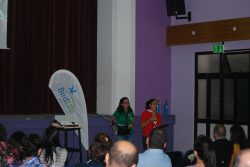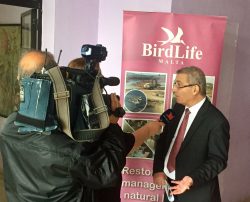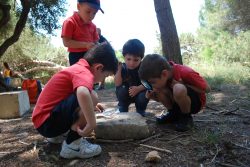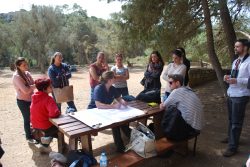
Linking to informal education with scouts and guides (Photo by BirdLife Malta)
BirdLife Malta in collaboration with the Directorate for Quality and Standards in Education today organised the Lifelong Learning through Nature concluding seminar which was held at Blata l-Bajda Middle School.
In support of this partnership the event was attended by Malta’s Minister for Education and Employment Evarist Bartolo who addressed the seminar saying, “this work is extremely important, getting out into the natural environment for learning experiences is vital and it shouldn’t just happen once a year for a field trip. A significant next step will be to get this work accredited to recognise how important it is, and there are further areas that we can look to develop next, for example after school clubs which will extend the amount of time when students have the opportunity to benefit from such programmes.”
Lifelong Learning through Nature (LLN) is a three-year collaborative partnership project (2014-2017) in which BirdLife Malta is the lead partner. The Erasmus+ funded project is run in collaboration with Malta’s Ministry for Education and Employment together with three international partners who are also bird conservation charities: the Royal Society for the Protection of Birds (RSPB-UK), BirdWatch Ireland, and the Polish Society for the Protection of Birds (OTOP).

Education and Employment Minister Evarist Bartolo being interviewed by the media at the end of the seminar (Photo by BirdLife Malta)
The project came about due to the realisation that young people need nature and nature needs young people. It is vital for conservation that we make a positive change in young people’s knowledge, attitude and behaviour so that they grow up realising the need to protect the world around them and live sustainably.
The project has focused on developing resources for environmental and sustainable development education and has worked with age groups from early years to post-secondary to engage them through formal and non-formal education. During the seminar, attended by educators and educational officials, college principals and heads of school, these resources were presented by a wide range of speakers who have been involved in development and implementation.
One initiative which will be launched this scholastic year is a partnership between BirdLife Malta and Malta College of Arts, Science and Technology (MCAST) which has seen the collaborative development of two new Learning Objectives related to environmental sustainability.

One of the nature-related activities organised by BirdLife Malta for school children (Photo by BirdLife Malta)
Speaking about the initiative Daniela Psaila, Science Coordinator at MCAST said, “Building an awareness of the natural environment and sustainable development within our students is very important as it is relevant to everyone no matter what subject they study or career path they chose.”
Another key element of the project has been a research study delivered in collaboration with the University of Malta, the results of which were presented at the half-day seminar. The findings from this research have provided documented evidence to show how vital connection with nature and outdoor education are for health, well-being and education. This knowledge and expertise is now being shared by the three international project partners to support implementation in their own and other European countries. The project aims to achieve these objectives by enhancing transnational cooperation between education and training providers and other stakeholders.

Even teachers are provided training thanks to BirdLife Malta’s environmental education programmes (Photo by BirdLife Malta)
BirdLife Malta’s Education Manager Hannah Chisholm said: “By working together we can share best practice and learn from each other to develop transferable resources suitable for the different age groups”.
This project has highlighted that Malta, being a small country where new initiatives can be implemented at a national scale with relative ease, can also be used as a testing ground for such projects in which the results can then be shared and adopted by other countries after being evaluated.
BirdLife Malta would like to thank organisations and individuals who have played a part in making this project the success which it has been. As a conservation charity we look forward to further development of this area of work to continue to strive for a future generation who looks after the environment better than we do today.
Read the Maltese version of the press release here.
